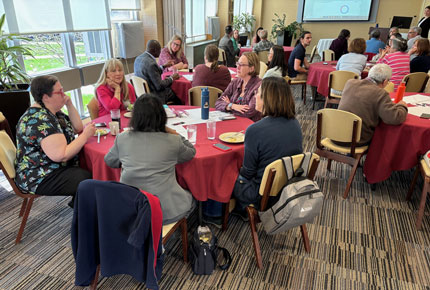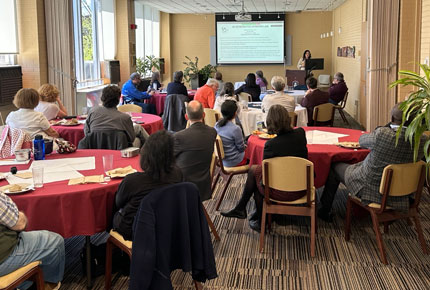Participants in the 2024-2025 faculty learning communities were asked to complete an anonymous survey about their experience. In response to the question, “What would you tell other faculty who are trying to decide whether or not to participate in a year-long Faculty Learning Community?” participants gave the following responses:
- It is an incredible use of your precious time! The main ways that I learned over the years to be a better teacher have come from colleagues and my own openness to learning and bettering myself.
- Great use of time- and fun as well!
- I would tell them it is a worthwhile experience. We all have time constraints but carving out time to discuss pedagogical practices with your colleagues is invaluable. I learned so much from other faculty and made a few friends in the process.
- Just do it. You'll wind up learning more about yourself and your teaching regardless of the topic because of the people who will be in the room with you throughout the year.
- a great learning opportunity and a way to meet others across campus
- To make sure there is time in one's schedule - flexibility is a must, and missing more than one or two meetings per semester due to over-scheduling can detract from the "community" aspect.
- It is well worth the time invested to connect with colleagues to develop strategies to help our students succeed
- Having dedicated time to discuss pedagogy is golden. Having a set schedule to do this was key. If I had tried to get together with other profs to talk shop, it would happen maybe once or twice an academic year. Invest in this time to learn or it may not happen!
- There is no downside to participating in the faculty learning community. We read and learn at our pace, determine for ourself what to try out, and how to make it work for us individually. Also, it is a rare opportunity to connect with colleagues from other disciplines in a prolonged learning engagement (committee work brings various colleagues together, but that has a clear task, unlike this purely learning experience).
- If you have the time, it's worth the engagement. It's important to get to know colleagues/peers outside of your own silo. This program helps to break down those barriers. Think of it as a networking opportunity.
- This was a very satisfactory experience! Having community on campus is so important, especially when it involves multidisciplinary collaborations. This is where new ideas are generated and relationships are built. If you are on the fence, I say don't hesitate and join in! You won't regret it.



